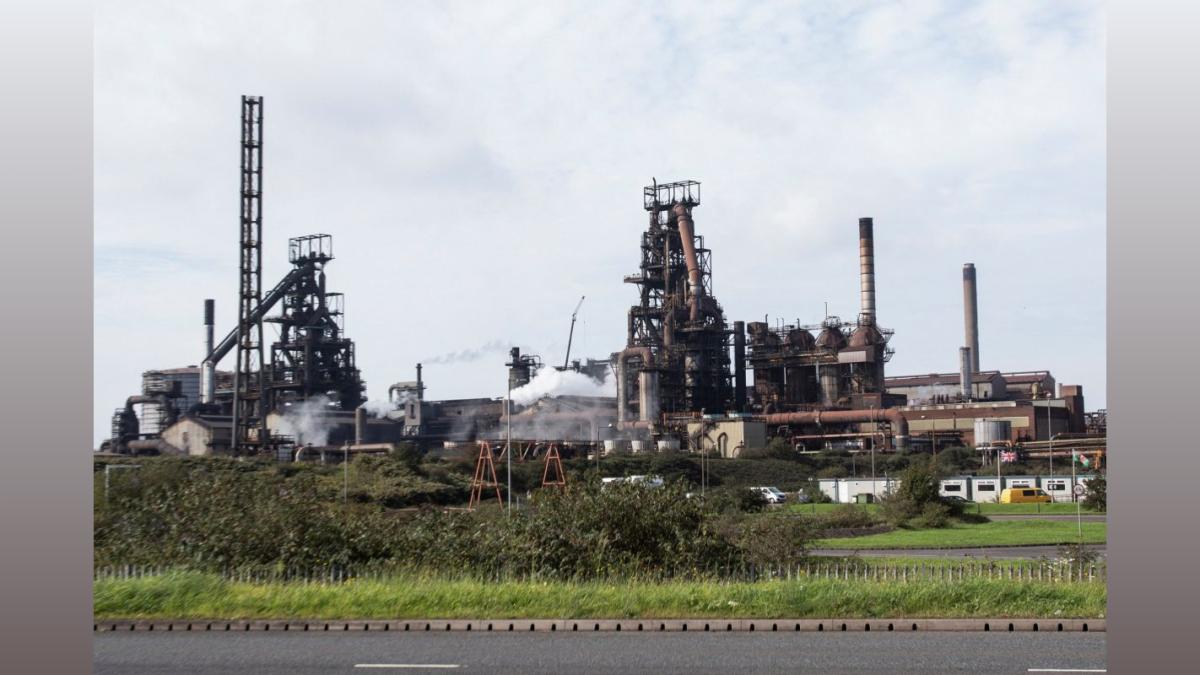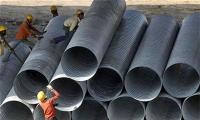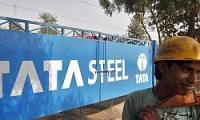Tata Steel to Close Blast Furnaces, Cut 2,800 Jobs in UK
Tata Steel plans to shut down its blast furnaces at Port Talbot, leading to 2,800 job losses. The move aims for a greener steel business, replacing furnaces with electric arc furnaces.

Photograph: Joann Randles/Reuters
London, Jan 19 (PTI) Tata Steel on Friday said it will shut down its two blast furnaces at the Port Talbot plant in South Wales in the UK, resulting in 2,800 job losses, as part of its effort to make its operations greener.
The steelmaker will commence statutory consultation on the proposed restructuring plan and support arrangements for affected employees, Tata Steel said in a statement.
This plan is intended to reverse more than a decade of losses and transition from the legacy blast furnaces to a more sustainable, green steel business.
The transformation would secure most of Tata Steel UK's existing product capability and maintain the country's self-sufficiency in steelmaking, while also reducing Tata Steel UK's CO2 emissions by 5 million tonnes per year, the Indian steelmaker said.
Tata Steel will replace the two blast furnaces at the plant with electric arc furnaces under the plan to reduce emissions and costs.
With the closure of both blast furnaces at the Port Talbot plant, related facilities such as coking ovens and the steel shop would also be shut down.
"Up to 2,800 employees are expected to be potentially affected, out of which around 2,500 roles would be impacted in the next 18 months," Tata Steel said. A further 300 jobs are to go in three years.
The company will endeavour to maximise voluntary redundancies and proposes to commit in excess of GBP 130 million to a comprehensive support package for affected employees, including skills training and job-seeking initiatives.
This is in addition to the GBP 100 million funding for the Transition Board set up with UK and Welsh governments to support affected employees, contractors and communities, Tata Steel said.
Tata Steel said the plant will continue to roll slab into hot-rolled coil (HRC) for a transition period, importing from Tata India, the Netherlands and other "strategic suppliers" on the international market.
About 200 positions will be saved by maintaining operations at the site's hot strip mill, which rolls steel slab.
T V Narendran, Tata Steel's CEO and Managing Director said: The course we are putting forward is difficult, but we believe it is the right one. Having invested almost GBP 5 billion in the UK business since 2007, we must transform at pace to build a sustainable business in the UK for the long-term.
The Community Trade Union said Tata and the UK government "must reconsider their positions to safeguard the future of British steelmaking, and head off a major industrial dispute".
The government has agreed to give Tata GBP 500 million towards the installation of a new 3 million tonnes per year electric arc furnace, which will be operational by 2027. As part of the deal, Tata agreed to invest GBP 700 million.
But unions have lambasted the deal, which they say has ignored other options such as direct-reduced iron, which could allow Tata to continue producing virgin iron in the UK.
Tata Steel said it was not feasible or affordable to adopt trade union proposals to continue production at the loss-making plant during a "transition to greener, cheaper steelmaking operations".
The cuts come despite the government providing GBP 500 million of financial backing for Tata's GBP 1.25 billion four-year plan to build electric arc furnaces, which make steel from scrap metal rather than virgin steel, made from scratch.
Tata Steel said that Port Talbot's two high-emission blast furnaces and coke ovens would close in a phased manner with the first blast furnace closing around mid-2024 and the remaining heavy-end assets would wind down during the second half of 2024.
The proposal also includes a wider restructuring of other locations and functions across the company, including the intended closure of the Continuous Annealing Processing Line (CAPL) in March 2025.
Rishi Sunak insisted that the government's investment showed it was absolutely committed to British steelmaking but Labour's shadow business minister, Jonathan Reynolds, has described its strategy as GBP 500 million for 3,000 job losses.
The steelmaker will commence statutory consultation on the proposed restructuring plan and support arrangements for affected employees, Tata Steel said in a statement.
This plan is intended to reverse more than a decade of losses and transition from the legacy blast furnaces to a more sustainable, green steel business.
The transformation would secure most of Tata Steel UK's existing product capability and maintain the country's self-sufficiency in steelmaking, while also reducing Tata Steel UK's CO2 emissions by 5 million tonnes per year, the Indian steelmaker said.
Tata Steel will replace the two blast furnaces at the plant with electric arc furnaces under the plan to reduce emissions and costs.
With the closure of both blast furnaces at the Port Talbot plant, related facilities such as coking ovens and the steel shop would also be shut down.
"Up to 2,800 employees are expected to be potentially affected, out of which around 2,500 roles would be impacted in the next 18 months," Tata Steel said. A further 300 jobs are to go in three years.
The company will endeavour to maximise voluntary redundancies and proposes to commit in excess of GBP 130 million to a comprehensive support package for affected employees, including skills training and job-seeking initiatives.
This is in addition to the GBP 100 million funding for the Transition Board set up with UK and Welsh governments to support affected employees, contractors and communities, Tata Steel said.
Tata Steel said the plant will continue to roll slab into hot-rolled coil (HRC) for a transition period, importing from Tata India, the Netherlands and other "strategic suppliers" on the international market.
About 200 positions will be saved by maintaining operations at the site's hot strip mill, which rolls steel slab.
T V Narendran, Tata Steel's CEO and Managing Director said: The course we are putting forward is difficult, but we believe it is the right one. Having invested almost GBP 5 billion in the UK business since 2007, we must transform at pace to build a sustainable business in the UK for the long-term.
The Community Trade Union said Tata and the UK government "must reconsider their positions to safeguard the future of British steelmaking, and head off a major industrial dispute".
The government has agreed to give Tata GBP 500 million towards the installation of a new 3 million tonnes per year electric arc furnace, which will be operational by 2027. As part of the deal, Tata agreed to invest GBP 700 million.
But unions have lambasted the deal, which they say has ignored other options such as direct-reduced iron, which could allow Tata to continue producing virgin iron in the UK.
Tata Steel said it was not feasible or affordable to adopt trade union proposals to continue production at the loss-making plant during a "transition to greener, cheaper steelmaking operations".
The cuts come despite the government providing GBP 500 million of financial backing for Tata's GBP 1.25 billion four-year plan to build electric arc furnaces, which make steel from scrap metal rather than virgin steel, made from scratch.
Tata Steel said that Port Talbot's two high-emission blast furnaces and coke ovens would close in a phased manner with the first blast furnace closing around mid-2024 and the remaining heavy-end assets would wind down during the second half of 2024.
The proposal also includes a wider restructuring of other locations and functions across the company, including the intended closure of the Continuous Annealing Processing Line (CAPL) in March 2025.
Rishi Sunak insisted that the government's investment showed it was absolutely committed to British steelmaking but Labour's shadow business minister, Jonathan Reynolds, has described its strategy as GBP 500 million for 3,000 job losses.
You May Like To Read
TODAY'S MOST TRADED COMPANIES
- Company Name
- Price
- Volume
- Vodafone Idea L
- 7.47 ( -5.92)
- 126290874
- Murae Organisor
- 1.65 (+ 4.43)
- 63657977
- Spicejet Ltd.
- 54.00 (+ 0.90)
- 24516615
- Suzlon Energy Ltd.
- 58.29 ( -3.06)
- 19518534
- GTL Infrastructure
- 1.51 ( -6.21)
- 16896268






 © 2025 Rediff.com India Limited. All rights reserved.
© 2025 Rediff.com India Limited. All rights reserved.